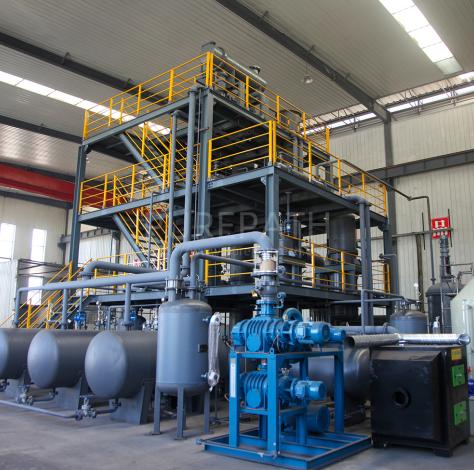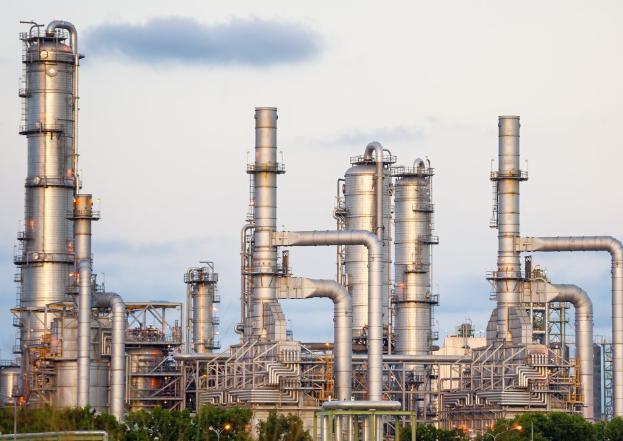Application of Waste Oil Re-refining Technology in the Chemical Industry
Waste oil re-refining is a key environmental and industrial process that converts used oils into valuable products. In the chemical industry, this technology is critical for recycling waste oil, reducing environmental harm, and supporting the circular economy. This article will explore the different types of waste oils used in re-refining, their applications in the chemical industry, and the challenges and opportunities associated with this process.

Types of Waste Oils Used in Re-refining in the Chemical Industry
Waste oil is generated from a variety of industrial processes and machinery, making it a diverse resource for re-refining. The chemical industry can use several types of waste oils for re-refining, including:
- Used Engine Oils: These oils are extensively used in automobiles and industrial machinery. Over time, they accumulate contaminants such as dirt, metal particles, and chemical additives, diminishing their effectiveness. However, through re-refining, these impurities can be removed, allowing the oils to be repurposed.
- Hydraulic Oils: Widely utilized in industrial machinery to transmit power, hydraulic oils often become contaminated with water, dirt, and other substances after use. Due to their high reuse potential, they are ideal for re-refining and reintegration into the chemical industry once purified.
- Coolant and Heat Transfer Oils: These oils, used in various chemical processes to manage temperature, can break down over time and become less effective. Instead of disposal, re-refining recovers the oil, allowing it to be used again in temperature-sensitive industrial processes.
- Transmission Oils and Gear Oils: These specialized oils are used in heavy-duty industrial machinery and automotive systems. Due to their robust chemical composition, they are ideal candidates for re-refining, after which they can be repurposed for industrial applications in the chemical sector.
Each of these waste oils requires different treatment processes during re-refining to ensure that impurities are removed and the oils are returned to a usable state, suitable for the chemical industry.
Applications of Re-refined Oil in the Chemical Industry
Re-refined oil has a wide range of applications in the chemical industry, providing sustainable alternatives to conventional materials. Below are the main applications with detailed descriptions:
Production of Base Oils for Lubricants

Re-refined oil is frequently used to produce base oils, which are the fundamental component of industrial lubricants. Lubricants play a vital role in ensuring smooth operations in chemical manufacturing by reducing friction and wear on machinery.
- Restoration of Chemical Properties: Through the re-refining process, contaminants like metals, carbon deposits, and degraded additives are removed, restoring the oil to a near-original state. This makes re-refined base oils comparable in quality to virgin base oils.
- Blending with Additives: Once restored, re-refined oils can be mixed with specific additives to create customized lubricants that meet the rigorous demands of chemical industry machinery, such as high-speed pumps or reactors.
- Friction and Wear Reduction: Lubricants produced from re-refined oil help to minimize mechanical wear, extending the operational life of equipment and reducing downtime for repairs. This is particularly important for large chemical plants where machinery runs continuously under extreme conditions.
- Energy Efficiency: Proper lubrication reduces mechanical friction, thereby decreasing the energy needed for machines to operate. In energy-intensive industries like chemical manufacturing, this can lead to significant energy savings and lower operational costs.
Feedstock for Petrochemical Production
Re-refined oil can be used as a sustainable and cost-effective feedstock in petrochemical production, which is essential for creating a variety of chemical products such as plastics, synthetic rubbers, and resins.
- Hydrocarbon Production: The re-refining process breaks down used oil into valuable hydrocarbons, which can be further processed through cracking and distillation to produce raw materials for petrochemical products like polyethylene and polypropylene. These materials are fundamental in the production of consumer goods, packaging, and industrial products.
- Reduced Reliance on Virgin Crude Oil: By using re-refined oil as a feedstock, petrochemical plants reduce their dependency on crude oil. This helps lower the environmental impact associated with extracting and processing virgin crude, contributing to a more sustainable production cycle.
- Cost-Effective Alternative: Re-refined oil often comes at a lower cost compared to virgin crude oil. For chemical manufacturers, this presents a valuable economic advantage while maintaining the high-quality feedstock required for petrochemical processes.
- Supporting Circular Economy: The use of re-refined oil supports the principles of a circular economy by recycling waste oils into valuable resources, thereby reducing waste and promoting sustainability within the chemical industry.

Manufacturing of Industrial Solvents
Re-refined oil is extensively utilized to create industrial solvents, which are essential for cleaning, degreasing, and dissolving materials in various chemical processes.
- Effective Cleaning Agents: Solvents derived from re-refined oil excel at cleaning equipment and pipelines in chemical plants, ensuring machinery operates smoothly. These solvents effectively remove oils, greases, and other contaminants from processing equipment
- Environmental Advantages: Solvents made from re-refined oil generally have a lower environmental impact than traditional petroleum-based solvents. They are often less volatile and produce fewer emissions, making them a more eco-friendly choice for industrial applications.
- Reduced Volatility and Emissions: Re-refined oil solvents tend to be less volatile, meaning they evaporate more slowly and release fewer harmful chemicals into the air. This not only creates a safer work environment but also helps chemical companies meet strict environmental regulations.
- Cost Efficiency: Re-refined solvents are typically more cost-effective than their virgin counterparts, allowing chemical manufacturers to reduce expenses while maintaining high performance in their cleaning and degreasing processes.
Additives for Chemical Products
Re-refined oil is used to produce additives that enhance the quality and durability of lubricants, greases, and other chemical products in industrial settings.
- Enhanced Viscosity: These additives improve the viscosity of lubricants, ensuring consistency under high pressure and heavy loads, which is crucial for reliable machinery performance.
- Thermal Stability: Re-refined additives boost the thermal stability of products, making them resistant to degradation at high temperatures, vital for industries with elevated temperature operations.
- Oxidation Resistance: They prevent oxidation, reducing sludge formation and extending product life, which lowers maintenance and replacement needs.
- Performance Improvement: Additives from re-refined oil enhance the overall performance of lubricants and greases, including anti-wear properties that reduce wear and increase productivity.
These detailed applications illustrate how re-refined oil is integrated into the chemical industry, providing solutions that support sustainability, cost savings, and environmental compliance. By utilizing re-refined oil, chemical manufacturers can reduce waste, minimize their reliance on virgin resources, and improve the overall efficiency of their operations.

Challenges and Opportunity of Waste Oil Re-refining in the Chemical Industry
Waste oil re-refining presents considerable environmental and economic advantages, yet it faces several significant challenges:
- Quality Control: Ensuring the quality and consistency of re-refined oils is essential for their market acceptance and reliability. This necessitates stringent quality control measures and the implementation of advanced refining technologies to produce oils that meet industry standards and performance expectations.
- Infrastructure: The success of waste oil re-refining programs depends heavily on the development of a robust infrastructure for waste oil collection, transportation, and processing. Efficient systems must be in place to handle the logistics of waste oil management and ensure that the re-refining process is both effective and scalable.
- Economic Viability: The economic feasibility of re-refining waste oil involves various factors such as the cost of feedstock, energy consumption, and the market demand for re-refined products. Balancing these factors is crucial to making re-refining a financially sustainable option.
Despite these hurdles, the potential benefits of waste oil re-refining are substantial. It offers a sustainable solution to waste management and resource recovery, reducing environmental impact and conserving natural resources. By investing in research and development to advance refining technologies, improving infrastructure to streamline operations, and enhancing public awareness to foster support, the chemical industry can play a pivotal role in advancing this technology and achieving broader adoption.







